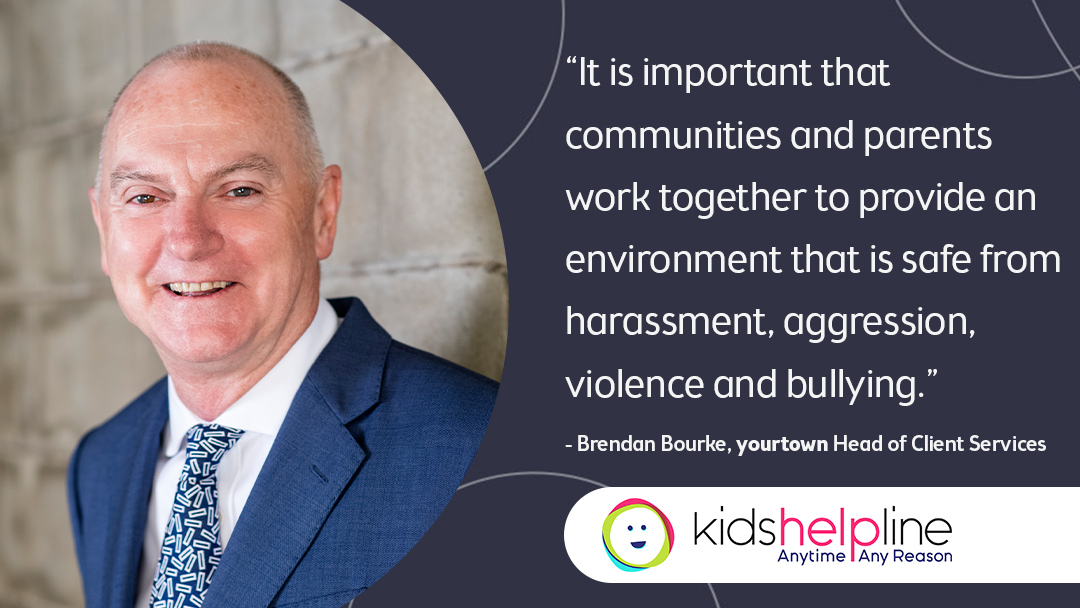- kids helpline
- New Kids Helpline data reveals a drop in bullying in 2020
New Kids Helpline data reveals a drop in bullying in 2020
Kids Helpline, a service of yourtown, has today announced a slight drop in contacts made by children and young people about face-to-face bullying in 2020 ahead of the National Day of Action against Bullying and Violence.
yourtown’s Head of Client Services Brendan Bourke cited school closures may have affected the contacts made to Kids Helpline specifically seeking support regarding face-to-face bullying in 2020, which is generally seen as a school ground problem, resulting in the 4% decrease in face-to-face bullying complaints.
“Face-to-face bullying contacts are often lower during school holidays, so it’s reasonable to say that home schooling may have had a similar effect,” Mr Bourke said.
Mr Bourke said bullying behaviours can be due to complex and diverse reasons, including underdeveloped emotional tools and coping mechanisms, limited parent interaction and peer pressure.
“But the year-on-year decrease may also relate to a shift in the primary issue that children and young people are presenting with. Their primary reason for contacting Kids Helpline may be regarding mental health or emotional wellbeing concerns, and bullying may only emerge as a factor when our counsellors unpack and explore the young person’s issues,” Mr Bourke continued.
"It is important that communities and parents work together to provide an environment that is safe from harassment, aggression, violence and bullying," says Mr Bourke.
"The National Day of Action is an important opportunity to reaffirm to adults to be positive role models within their family unit as bullying or violence in any form can have immediate and long-term effects on children and young people. Young children bystanders may feel uncomfortable witnessing bullying or violence but may be unsure of how to stop it from happening," he continued.
Kids Helpline, renowned as Australia’s only free, confidential 24/7 national children’s counselling and support service for 5 – 25 year olds, is celebrating it’s 30 year anniversary milestone this month and wants to send a clear message to the community that bullying and violence is never ok at any time.
“Last year the most downloaded topic from the Teens (13-18 years) section of the Kids Helpline website was bullying with 314,037 downloads, highlighting the growing demand from teens, parents and carers to find evidence-based support on many topics affecting children and young people,” he said.

“Our Kids Helpline @ School program supported by Bupa Health Foundation, is offered free to all primary schools nationally. Kids Helpline counsellors work with children from an early age to help them understand respectful relationships and behavioural boundaries both when face-to-face and online. Counsellors use videoconferencing technology to deliver interactive sessions aligned to the Australian Curriculum on topics including bullying. We need more discussion about the importance of mutual respect to stem bullying of any kind, face-to-face or cyberbullying, to ensure the wellbeing and safety of children and young people across Australia,” Mr Bourke continued.
“We need to increase awareness around early intervention, and to encourage children and teachers to take advantage of the free Kids Helpline @ School program to help children to learn coping strategies that assist in dealing with life’s challenges,” he said.
Kids Helpline Anti-bullying tips and strategies
Our top strategy to prevent or shut down bullying is to build self-efficacy – the capacity to create change for the better.
One of the best ways kids can do this is to be an upstander to bullying, rather than a bystander.
Bystanders
Bystanders are witnesses to bullying who do not intervene.
This may be because:
- They think someone else will intercede
- They don’t know what to say/do
But witnessing bullying hurts bystanders too.
Bystanders have a responsibility to be up standers.
Upstanders
To be an upstander, kids can use these tactics:
- Respectfully challenge the bullying by saying something like, "We don’t do that here."
- Interrupt the bullying by engaging with the person being bullied, e.g. "Hey Jack, there you are!"
- Give the person being bullied an excuse to leave, e.g. “The teacher is looking for you” or, “Hey, can you come help me with something for a minute?”
- Offer support. Do this once the person is safe from the situation, e.g. "I saw what was happening at lunch time. It is not ok for them to act that way! Are you ok?"
- Report it. If possible, report it together; being bullied is a lonely experience. Having someone who backs up your version of what happened can make a big difference to someone who is feeling hopeless or worthless.
Remember, bullying behaviour hurts everyone, including the people being bullied, those witnessing the bullying and those doing the bullying.
INTERVIEW/PHOTO/FILMING OPPORTUNITIES
- Brendan Bourke, yourtown Head of Client Services
- Leo Hede – Kids Helpline Virtual Services
- VNR footage available of Kids Helpline call centre and interviews with counsellors also available
Facebook: @kidshelpline, Insta @kidshelplineau, Twitter @KidsHelplineAU.
- Ends -
yourtown Corporate Communications & Media Advisor: Maree Reason-Cain Phone 0423 843 786 OR [email protected]